Romanian literature is the entirety of literature written by Romanian authors, although the term may also be used to refer to all literature written in the Romanian language or by any authors native to Romania.

Nicolae Iorga was a Romanian politician who held top posts, including prime minister and president of the Senate. He was also a historian, literary critic, memoirist, albanologist, poet and playwright. Co-founder of the Democratic Nationalist Party (PND), he served as a member of Parliament, President of the Deputies' Assembly, and cabinet minister. A child prodigy, polymath and polyglot, Iorga produced an unusually large body of scholarly works, establishing his international reputation as a medievalist, Byzantinist, Latinist, Slavist, art historian and philosopher of history. Holding teaching positions at the University of Bucharest, the University of Paris and several other academic institutions, Iorga was founder of the International Congress of Byzantine Studies and the Institute of South-East European Studies (ISSEE). His activity also included the transformation of Vălenii de Munte town into a cultural and academic center.
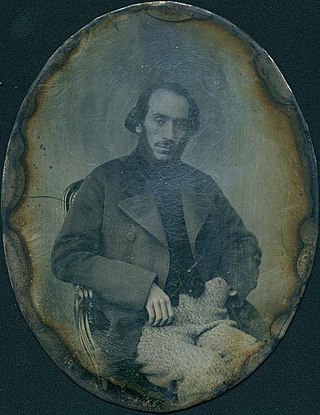
Nicolae Bălcescu was a Romanian Wallachian soldier, historian, journalist, and leader of the 1848 Wallachian Revolution.

Lucrețiu Pătrășcanu was a Romanian communist politician and leading member of the Communist Party of Romania (PCR), also noted for his activities as a lawyer, sociologist and economist. For a while, he was a professor at the University of Bucharest. Pătrășcanu rose to a government position before the end of World War II and, after having disagreed with Stalinist tenets on several occasions, eventually came into conflict with the Romanian Communist government of Gheorghe Gheorghiu-Dej. He became a political prisoner and was ultimately executed. Fourteen years after Pătrășcanu's death, Romania's new communist leader, Nicolae Ceaușescu, endorsed his rehabilitation as part of a change in policy.
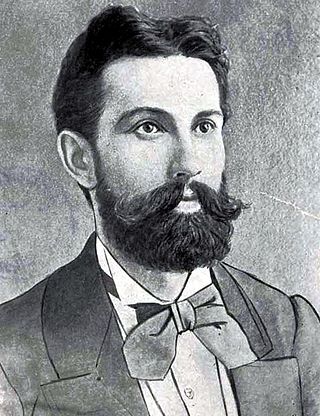
Nicolae Densușianu was a Romanian ethnologist and collector of Romanian folklore. He was a corresponding member of the Romanian Academy, with a specialty in history. His main work, for which he is chiefly remembered, was the posthumously printed Dacia Preistorică (1913), with a preface contributed by C. I. Istrati; a facsimile edition was published in 2002 by Editura Arhetip, Bucharest. In Dacia Preistorică Densușianu combined the studies of folklore and comparative religion with archaeology to construct a theory about the Prehistoric cultures of Dacia. The work has drawn criticism for unprofessionalism and evidence of nationalism, and for standing at the source of Dacianism. Mainstream scholars regarded his book as fanciful and unscientific.

The Babeș-Bolyai University is a public research university located in Cluj-Napoca, Romania. It was created from a 1959 merger of Bolyai University and Victor Babeș University, whose histories can be traced to the Academia/Universitas Claudiopolitana founded in 1581. It occupies the first position in the University Metaranking, initiated by the Romanian Ministry of Education and Research in 2016

Alexandru Moșanu was a Moldovan politician, historian and professor.

Gheorghe Cristescu was a Romanian socialist and, for a part of his life, communist militant. Nicknamed "Plăpumarul", he is also occasionally referred to as "Omul cu lavaliera roșie", after the most notable of his accessories.
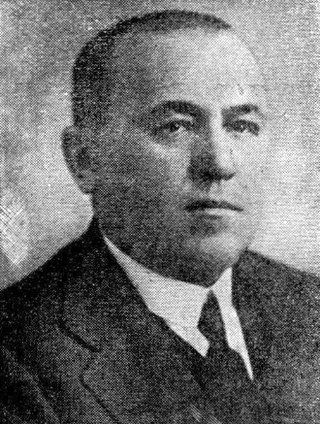
Emil Hațieganu was a Romanian politician and jurist, a prominent member of the Romanian National Party (PNR) and of its successor, the National Peasants' Party (PNȚ); he was physician Iuliu Hațieganu's brother. Before his arrest, he was an honorary member of the Romanian Academy.
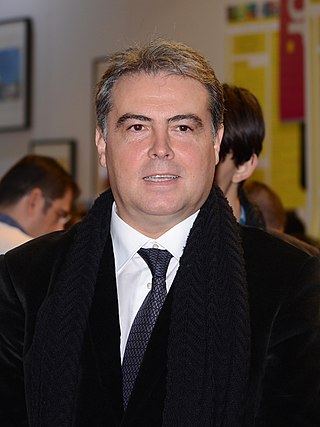
Adrian Mihai Cioroianu is a Romanian historian, politician, journalist, and essayist. A lecturer for the History Department at the University of Bucharest, he is the author of several books dealing with Romanian history. He is also noted for his contribution as co-author of a high school textbook.
Alexandru Zub is a Romanian historian, biographer, essayist, political activist and academic. A former professor at the University of Iași, noted for his contribution to the study of cultural history and Romanian history, he is currently head of the A.D. Xenopol Institute of History. He was elected a full member of the Romanian Academy in 2004 ; currently, he serves as head of the Academy's History Department.
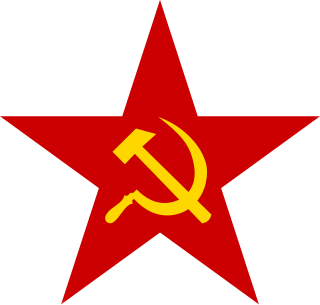
Amicii URSS, which carries the same meaning) was a cultural association in interwar Romania, uniting left-wing and anti-fascist intellectuals who advocated a détente between their country and Joseph Stalin's Soviet Union. Created in the spring of 1934 by Petre Constantinescu-Iași, an activist of the previously outlawed Romanian Communist Party, the society took its inspiration from the French Amis de l'URSS and from the worldwide network. Actively encouraged and financed by the Comintern, Amicii URSS was viewed with suspicion by authorities — never officially registered, it was eventually banned on the orders of Premier Gheorghe Tătărescu on November 25, 1934. It ceased its activity after that point, but constituted a precedent for the Romanian Society for Friendship with the Soviet Union (ARLUS).
The Socialist Party of Romania was a Romanian socialist political party, created on December 11, 1918 by members of the Social Democratic Party of Romania (PSDR), after the latter emerged from clandestinity. Through its PSDR legacy, the PS maintained a close connection with the local labor movement and was symbolically linked to the first local socialist group, the Romanian Social-Democratic Workers' Party. Its creation coincided with the establishment of Greater Romania in the wake of World War I; after May 1919, it began a process of fusion with the social democratic groups of in the former territories of Austria-Hungary — the Social Democratic Parties of Transylvania, Banat and Bukovina. The parties adopted a common platform in October 1920. Progressively influenced by Leninism, the PS became divided between a maximalist majority supporting Bolshevik guidelines and a reformist-minded minority: the former affiliated with the Comintern as the Socialist-Communist Party in May 1921, while the minority eventually established a new Romanian Social Democratic Party.

The July Theses was a speech delivered by Nicolae Ceaușescu to the executive committee of the Romanian Communist Party (PCR) on 6 July 1971.

The Democratic Nationalist Party or Nationalist Democratic Party was a political party in Romania, established by historian Nicolae Iorga and jurist A. C. Cuza. Its support base was in the lower reaches of the Romanian middle class, and, especially through Cuza's ideology, it reflected the xenophobia, economic antisemitism, and producerism of that particular environment. The PND was a weak challenge to the mainstream political forces, either conservative or liberal, failing in its bid to become Romania's third-strongest party. By 1916, it was effectively split between Iorga's moderates and Cuza's radicals, suspending its activity for the remainder of World War I.

The National Popular Party was an antifascist political party in Romania, founded during World War II as the underground Union of Patriots. The latter had defined itself as a spontaneous movement of resistance to the dictatorial regime of Ion Antonescu, but was largely known as a front for the illegal Romanian Communist Party. Its founders—Dumitru Bagdasar, Gheorghe Vlădescu-Răcoasa, Simion Stoilow—were closely cooperating with PCdR men, but also with liberal opposition forces. Repressed by the authorities, the UP made a comeback after the pro-Allied August 23 Coup of 1944, when it endured as a small ally of the communists—mostly controlled directly by them, but sometimes rebellious.
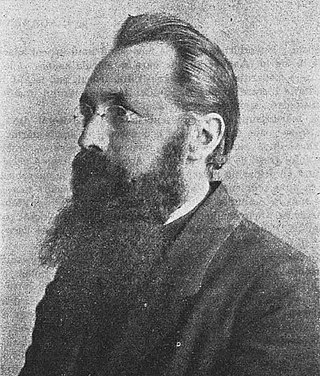
Ion Agârbiceanu was an Austro-Hungarian-born Romanian writer, journalist, politician, theologian and Greek-Catholic priest. Born among the Romanian peasant class of Transylvania, he was originally an Orthodox, but chose to embrace Eastern Catholicism. Assisted by the Catholic congregation of Blaj, he graduated from Budapest University, after which he was ordained. Agârbiceanu was initially assigned to a parish in the Apuseni Mountains, which form the backdrop to much of his fiction. Before 1910, Agârbiceanu had achieved literary fame in both Transylvania and the Kingdom of Romania, affiliating with ASTRA cultural society in 1912; his work was disputed between the rival schools of Sămănătorul and Poporanism. After a debut in poetry, he became a highly prolific author of novels, novellas, and other forms of prose, being rated as "Chekhovian" or "Tolstoyan" for his talents in describing the discreet suffering of common folk.

Doina, or Doină, is a political poem by the Romanian Mihai Eminescu. It was first published in 1883 and is therefore seen by some as Eminescu's final work in verse, although it may actually be an 1870s piece, inspired or enhanced by the perceived injustice of the Berlin Treaty. A variation of the doina, picked up from Romanian folklore, it is noticeably angry to the point of rhetorical violence, a radical expression of Romanian nationalism against invading "foreigners", with additional hints of ecopoetry and "anti-technicist" discourse. Doina delineates the ideal geographical space of Greater Romania, at a time when Romanian-inhabited regions were divided between an independent kingdom and multinational empires. Its final lines call on Stephen the Great, depicted as a sleeping hero, to take up the cause of Romanians and chase foreigners out with the sound of his horn. The same basic themes appear in another poem by Eminescu, the anthem-like La arme, which is sometimes discussed as a variant of Doina.

Greater Moldova or Greater Moldavia is an irredentist concept today used for the credence that the Republic of Moldova should be expanded with lands that used to belong to the Principality of Moldavia or were once inside its political orbit. Historically, it also meant the unification of the lands of the former principality under either Romania or the Soviet Union. Territories cited in such proposals always include Western Moldavia and the whole of Bessarabia, as well as Bukovina and the Hertsa region; some versions also feature parts of Transylvania, while still others include areas of Podolia, or Pokuttia in its entirety. In most of its post-Soviet iterations, "Greater Moldova" is associated with a belief that Moldovans are a distinct people from Romanians, and that they inhabit parts of Romania and Ukraine. It is a marginal position within the Moldovan identity disputes, corresponding to radical forms of an ideology polemically known as "Moldovenism".

Laszlo Alexandru is a Romanian essayist, literary critic, literary historian, translator and journalist. He is an Italian teacher. He is editor of E-Leonardo cultural magazine and coordinator of the Italian collection at the "Ecou Transilvan" Publishing House. He is known for his Dante interpretation contributions in the university field in Romania and in Europe, in the Romanian culture and in the Italian culture. Also known in Israel for his cultural studies on the Holocaust. Since 2014, he is a member of the Romanian Writers' Union. His books have been published in Romania and in the Republic of Moldova. He won the Romanian Writers' 2020 Special Award for Lectura lui Dante. Infernul; Purgatoriul; Paradisul. Knight (Cavaliere) of the Order of the Star of Italy by decree of the President of the Republic, on the recommendation of the Minister of the Foreign Affairs.

















